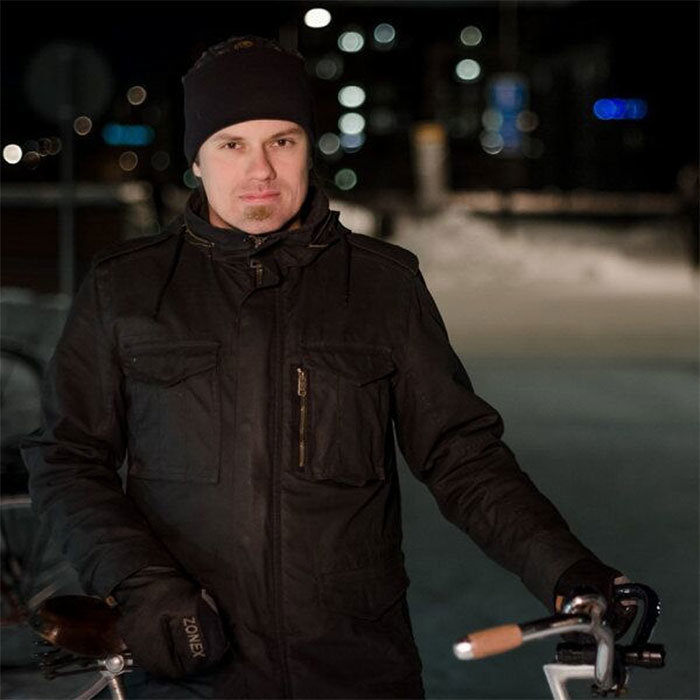Kids in Finland Commuting to School by Bicycle and Sled, in Snow, at Negative-22 Degrees
"You can use your single-speed upright granny bike with summer tires all year long"
I'm a native New Yorker and former die-hard urbanite. But now I've given the city up for good, and have permanently relocated to a rural farm in the American South. This "Free Range Design Observations" section will detail the design-related observations made as a result of this radical location change.
____________________________________
Because our farm is far from other people and stuff in general, I rarely meet neighbors or interact with other members of this community. But this morning I had to drive into civilization for physical therapy (bum rotator cuff and lower back woes, woo-hoo) and the exercise room was filled with chatty patients.
Today's hot topic of discussion: Potential snow on the local forecast, and lamentations of how the local supermarket will be shy of milk, bread and meat as a result. Apparently it snows so little down here that people go overboard on stocking up at even the mention of snow.
This made me recall Scandinavia, which is just about the opposite in terms of snow panic. They are highly adapted. The last time I was in Helsinki there was a heavy snowstorm, and I was interested to see that city workers there use gravel, not chemical salt, to scatter on the sidewalks for traction. Also, they don't bother shoveling (or at least they didn't during this particular storm). As it was a Friday night, I saw women dressed to the nines to go clubbing--and they navigated the unshoveled, gravel-strewn snow in high heels.
Later in the trip I visited the Arctic Circle, and as we were scheduled to fly out, the airport was hit with a snowstorm. I figured the flight would be canceled for sure. Nope; they squirted some blue liquid all over the plane, I watched it wash down the window next to my seat. Then we just took off, right in the middle of a rip-roaring storm. Zero problems.
Lastly I'll recount something I didn't see there in person, but read about earlier this year: Kids in Finland who commute to school by bicycle, even in the dead of winter.
That was Tweeted by Pekka Tahkola, an "urban well-being engineer" and the City of Oulu's Cycling Coordinator. As Mother Nature Network reported,
Although it may be hard for many parents in the U.S. to imagine letting a kid bike to school in any weather, it's the norm in parts of Finland, Tahkola says. "It's normal; always been like that. I cycled and kicksledded to school when I was a kid, too," he says. "And it's the same thing even in minus 30 C." (That's minus 22 Fahrenheit, in case you're wondering.)
 Image by Pekka Tahkola
Image by Pekka Tahkola
 Image by Pekka Tahkola
Image by Pekka Tahkola
 Image by Pekka Tahkola
Image by Pekka Tahkola
I know what you're thinking: These kids must have some super-tricked-out Finnish winter bikes, yeah? Actually, no:
Bicycling is easy in the area, even in winter, says Tahkola…. It has to be — in Oulu they typically have snow from November through April. The bike and walking paths are so well maintained that riders don't need special tires or gear to navigate them.
 Image by Pekka Tahkola
Image by Pekka Tahkola
"You can usually just use your single-speed upright granny bike with summer tires all year long, even on snow," he says. "We have great infrastructure and winter maintenance, that make cycling fast, easy and comfortable even in winter conditions. The distances are often shorter than with a car."
 Image by Pekka Tahkola
Image by Pekka Tahkola
In contrast, the biggest weather change I've had to deal with after my move down South is brutally hot, humid summers. It's especially bad on a farm, as there's outdoor labor to be done. It makes me wilt. I watched my 72-year-old neighbor, an ex-coal-miner, dig post holes for ten 4x4s in 100-degree heat that I just couldn't cut.
However, I've got no problem doing outdoor labor when it's freezing out. If the work is hard, you're only cold for the first few minutes. So I hope it does snow tomorrow.
-
oFavorite This
-
Q1Comment
K
{Welcome
Create a Core77 Account
Already have an account? Sign In
By creating a Core77 account you confirm that you accept the Terms of Use
K
Reset Password
Please enter your email and we will send an email to reset your password.



Comments
There is no bad weather, there is only bad clothing.